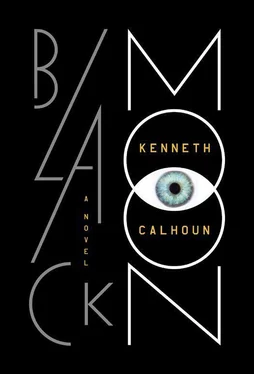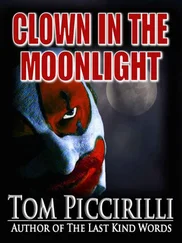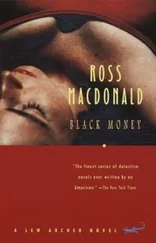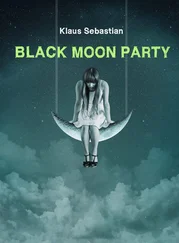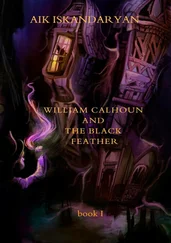WHEN BIGGS FIRST ENTERED THE MAIN room of the loft and found her gone, he froze as his mind took in the evidence—the overturned chair, the rope and bungee cords loosely nested on the floor, the socks he had used to pad the bindings, the open window. He rushed to it, shouting her name, sending it echoing through the alley. There was no sign of Carolyn below. As he checked the bathroom and the closets, he tried to see her fate as ambiguous, sidestepping the obvious: the only way out was down.
He searched the neighborhood for her, hoping to turn a corner and see her sitting on a stoop, confused, maybe scraped up a bit and babbling, but okay. Back in the loft, he sat in the darkness, suffering fits of guilt. Why hadn’t he tied her more securely to the chair? Why had he left the window open? Of course, the biggest mistake was that he allowed himself to sleep for so long in the bedroom. How could he have been so weak when so much was at stake? The same way people fall asleep at the wheel of a vehicle traveling at high speed, he knew. Sleep, if held off for too long, had a way of overriding even the body’s most basic directives to persist. And though it had lost its grip on everyone else he knew, sleep retained him as its servant. Why? He did not know. Nor did he know if there were others like him.
It occurred to him that Carolyn might have tried to return to her father’s house in the suburbs. Maybe she had somehow found her way to the ground, maybe leaping to the fire escape—something she might have tried in her delirious state—and started out for her childhood home. They had discussed this retreat as the epidemic began, wondering if it would be a safer place to ride out the crisis, but he insisted on staying in the city.
His preference was always for the city, even though he was from an incorporated sprawl of housing developments thirty miles out. As early as high school, he had vowed to escape what he perceived to be suburban somnolence. Inheriting his father’s insurance agency would be like agreeing to a lifelong coma. Throughout college, his experiences downtown—attending readings and workshops, mixing with artists, musicians, and filmmakers like Carolyn and her friends—confirmed his belief that cities were the flashpoint of consciousness; the suburbs were the geography of sleep. Even now, as the city howled and shuddered, he believed that it was the better place to be—that help, if it was coming, would surface here first.
She didn’t buy it. She had wanted to retreat to her childhood bedroom in a city neighboring his own hometown. They had spent their first summer together in that room as she nursed her dying mother and distracted herself by animating The Dream, which had brought them together. Just over a year ago, she had hidden there for weeks, trying to work through what she called a creative block.
“We’re safer here,” he tried to convince her. “Six floors up, where no one can reach us. Plus, everything we need to survive is within a few blocks.”
“Everything that can kill us is within a few blocks too,” she told him. People were her greatest fear, and in the simple math of her reasoning, there were more here, around them, going slowly insane with sleeplessness. At least her father’s sprawling property had walls, a gated entry, dogs.
He couldn’t help replaying this conversation over and over in his mind, finding it hopeful. If she were to go anywhere, it would be there. Yet he was trapped by indecisiveness. What if he left and she came back?
He decided to wait another twenty-four hours. He put together his old hiker’s backpack with items he surmised were necessities: a first aid kit, a flashlight, a tin plate and cup from a camping set. He excavated the closet to retrieve an old lightweight sleeping bag. Sleeping bag. The term already felt archaic and provocative. Sleeping bag, he had said to himself as he cinched it to the pack. Sleeping bag sleeping bag sleeping bag. That’s a funny combination of words when you think about it. Sleeping bag. He let out a single bark of laughter and the sound startled him.
With the pack ready and positioned by the door, he returned to Carolyn’s abandoned studio.
It struck him as he surveyed the props and tabletop set that she had made a career of being invisible. Carolyn was not present in her stop-motion films, but rather slipped in between frames—in the gap where time was vast and formless—and incrementally repositioned her actors, her landscapes and sets, before retreating behind the lens to snap the shot. “The human eye can only see so much,” she once said in an attempt to explain frame rate to him. “There are spaces between the events we see where things get past us. Magicians know this too, with their sleight of hand tricks. If you can find the rhythm of those spaces, the openings in time, you can hide whole worlds inside them.” Is that where she had gone? he wondered. Had she slipped into the gap?
The evidence of her presence was seen in the lifelike movement of her film worlds, the tiny furrowing of brows or gentle flicker of cellophane flames, or the ropy limbs of a warrior churning with momentum past the hand-cranked scroll of sky. It was impossibly time-consuming work, resulting in only seconds of screen time at the end of a week. She had enjoyed the magic of it, the power, but worried over every detail, continually burdened with that particular brand of inner torment reserved for artists. It eventually became too much, her patience or ideas depleted, he never fully knew. She hadn’t attempted to make a film—neither stop-motion nor computer animation—in over a year. Not since returning from her stay at her father’s house.
At midnight, he slipped out the entryway of the building, legs unsteady with emotion. Over the darkened city, the sky was vibrant, dusted with stars. He crossed the vast, empty post office parking lot as rats scurried from shadow to shadow and office paperwork sliced through in the wind. He called out for Carolyn one last time, then stood motionless listening for a response.
Behind him, his building howled like an asylum. Human voices in every mode of despair seeped through the walls after him. Biggs turned away, the pack bouncing on his back as he crossed the open pavement to the concrete channel where black water slid slowly by. Across the flood channel, the massive post office and train station complex stood silent and dark. He could see people stumbling across the unlit overpasses of the freeway. He knew he could move among them, passing as sleepless so long as he aped their jittery movements and circular speech patterns, their slurry delivery and convoluted logic. But his fear of accidentally falling asleep in their presence was enough to steer him away, knowing the rage it would trigger.
He took his bearings and aimed himself in the direction of Carolyn’s childhood home in the suburbs.
AT SUNRISE, Biggs realized he was only a block from the first place they had rented together—an apartment in an old deco building. Could she, in her confusion, have gone back there? He decided it was worth a shot and cut through a weedy lot, then ducked through a gap in a chain-link fence, placing himself on the street of their first address. The building stood under tall, creaking palms. There were doves cooing somewhere in the shelter of fronds and the narrow shadows cast by the shaved trunks stretched across the road. Theirs had been the third floor balcony on the pink stucco structure. He thought about calling up to it, but was reluctant to draw attention to himself.
The front doors were locked, so he set down his pack and hopped the low fence of the yard. Small bungalows lined the yellowy patch of lawn. He stood where Carolyn used to sunbathe, in her own modest way—shorts rolled up, a bikini top or sleeveless T-shirt, the sun bringing out the freckles on her shoulders. They both loved this place, which seemed to be stuck in the 1930s. The building had the qualities of a ship, with its nautical angles and prowlike façade. A church, which had been converted into a banquet hall, loomed behind it. On the cupola, a golden angel lifted a horn to its lips. Newer properties crowded in, including a bland cinderblock medical center next door, which drew anti-abortion protesters on weekends.
Читать дальше
